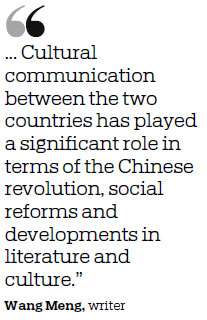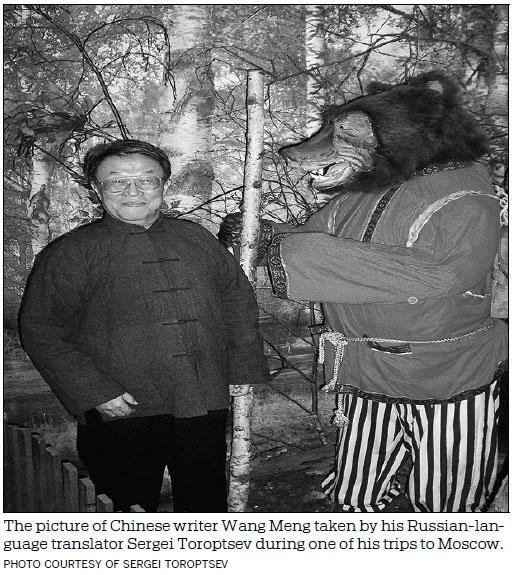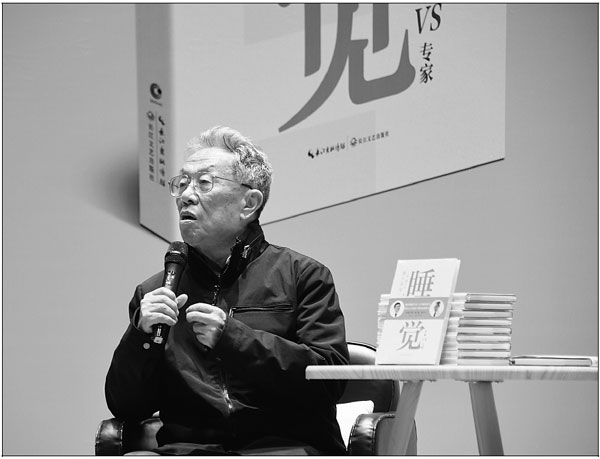Champion of culture
Veteran Chinese writer Wang Meng is honored for his contribution to Sino-Russian people-to-people ties, Mei Jia reports.
Veteran writer Wang Meng, also a former culture minister, is among 10 Chinese honored for their contribution to Sino-Russian people-to-people exchange.
The announcement was made during President Xi Jinping's state visit to Russia last week. The awards ceremony held in Moscow on Wednesday, was jointly hosted by Chinese newspaper Guangming Daily and Russian news agency TASS, with each side naming 10 awardees. China and Russia will mark the 70th anniversary of diplomatic ties this year.
Wang, 85, has forged close relations with Russia over the decades through culture and the arts.
|
Wang Meng attends his new book launch in Beijing in March. The book, coauthored with a doctor, explores ways to ease anxiety and sleep better. Provided to China Daily |
He can recall not just the names of the many Russian artists whose works he enjoys, but also plot details of books since his first contact with Soviet-era art in 1945, when he was 11 years old.
At the time when Wang became a member of then underground Communist Party of China, he read a novel by Polish-Soviet political activist Vanda Vasilevskaya, and learned to sing the Russian song Katyusha. During a visit to Russia in more recent times, Wang says, his memory of musicians' names "surprised and impressed a Russian cultural official".
Wang moves quickly for his age, as noticed during an interview to China Daily at his apartment in Beijing that overlooks a big park.
Almost 40 years ago, Wang's works were already available in overseas markets.
In 1987, his novel Move-to-Turn into Human Forms was successful in the former Soviet Union. The first edition sold 100,000 copies and got many fans there. Besides, he has been promoting China-Russia cultural exchange for long.
"I am quite familiar with Russian culture and art, and I respect it and adore it," he says.
In 2003, Wang was given an honorary doctorate by the Institute of Far Eastern Studies under the Russian Academy of Sciences for "your reputation in China, your achievements in bringing Chinese culture and literature to a new level, and your social activities that promote mutual exchanges in culture", as the institute's letter to Wang says.
In 2016, Wang spoke as an international delegate at the Fifth St. Petersburg International Cultural Forum.
"I said there that cultural communication between the two countries has played a significant role in terms of the Chinese revolution, social reforms and developments in literature and culture," Wang says.
With his debut novel, Long Live Youth, in 1953, Wang launched his career as one of China's most prolific and important writers in the contemporary literary scene. And there's no sign of him running out of inspiration for stories. Wang has published new books recently. Two major recurring themes in many of his works - youth and revolution - are seen by critics as the reverberations of his absorption of Soviet and Russian literature and art.
Wang says he has watched Soviet movies such as The Fall of Berlin, directed by Mikheil Chiaureli, multiple times. He also requested for a rebroadcast on radio of Anton Chekov's stage plays that debuted in Beijing in 1955. Wang was told by a more experienced writer when he started his writing career with novels that a theme is crucial to long-form writing.
"I was puzzled until I got a chance to listen to a symphony by Dmitry Shostakovich," he says. "Then I understood what the theme is - a lingering thread in the work which has variations that are mutually connected."
What touched him the most, Wang says, is Leo Tolstoy's masterpieces Anna Karenina and Resurrection.

"I was reading Honore de Balzac almost at the same time. I'd admit Balzac writes with a scalpel in hand. But I was moved deeper by Tolstoy," Wang adds.
To him, Russian literature is about its humanitarianism.
"Tolstoy is a kaleidoscope to various types of human emotions: regret, sympathy, remorse and more.�� His influence is deep in my own writing," Wang says.
Fyodor Dostoevsky's book Humiliated and Insulted inspired Wang, too.
"The title hints at social revolution. People were humiliated or insulted, and they felt uneven pressure, they burst into a revolution," he says.
Aleksei Rodionov, a Sinologist and director of the Confucius Institute at St. Petersburg State University, said earlier that Wang is among Chinese writers who could win the Nobel in future.
"The number of Wang's works introduced to Russian readers is big, and he is actively involved in exchange events, and has long connections with Russian Sinologists," Rodionov says.
Wang says he has brought Sinologists like Sergei A. Toroptsev, the Russian-language translator of ancient Chinese poet Li Bai, to China. Wang has also published a collection of works on the former Soviet Union, the copyright for which has been sold to a Vietnamese publisher. There's another first-person novella inspired by his links to Russian culture.
Toroptsev tells China Daily that it was Wang who showed him different aspects of Chinese literature. His trip to Li Bai's hometown in Sichuan province was also organized by Wang.
"The works of Wang Meng are perceived to be a turning point in Chinese literature, from dogmatic to artistic and humanistic expressions, as well as a revival of the best traditions of Chinese artistic classics," Toroptsev says.
"He shows foreign readers how an ordinary Chinese lives: He introduces the readers to the depths of Chinese life, into their homes and consciousness."
The chairperson of China Writers Association Tie Ning says Wang's writing is "colorful and complicated", and has had an impact on contemporary Chinese literature, research and comparative studies. "Wang has passion, vigor and wisdom even after many bitter experiences."
Wang's work has enlightened some scholars and translators in other countries, as his books have been published in more than 20 languages. Gladys Yang and Maha Chakri Sirindhorn of the Thai Royal family have translated Wang's writings.
Throughout his years first as a student Party member, with the Youth League Committee, and later moving from Beijing to the Xinjiang Uygur autonomous region, and then moving back as culture minister, and as a professional writer - Wang has kept his sense of optimism, humor and romance lingering in his works.
He gets on WeChat, and wears a sporty wristband to record his daily exercise. He speaks Russian and some English when needed.
His latest book coauthored with a doctor on how to sleep well is on a topic he first discussed with German Sinologists almost 30 years ago. In recent years, Wang has been writing widely on ancient wisdom, recognition of traditional culture, cultural confidence, novels and also himself.
His connections with Soviet culture were so deep that in 2012, when his wife of 55 years passed away, Dark Is the Night, a Soviet song associated with the Great Patriotic War, was played at her funeral. Tears rolled down Wang's face when he heard the song being played.
Contact the writer at meijia@chinadaily.com.cn

(China Daily Global 06/11/2019 page15)



















